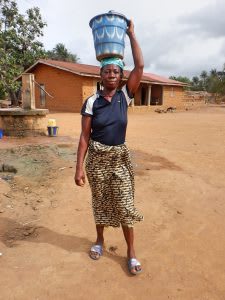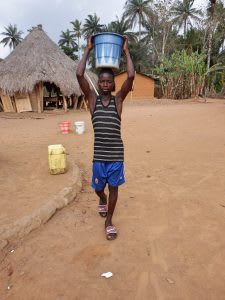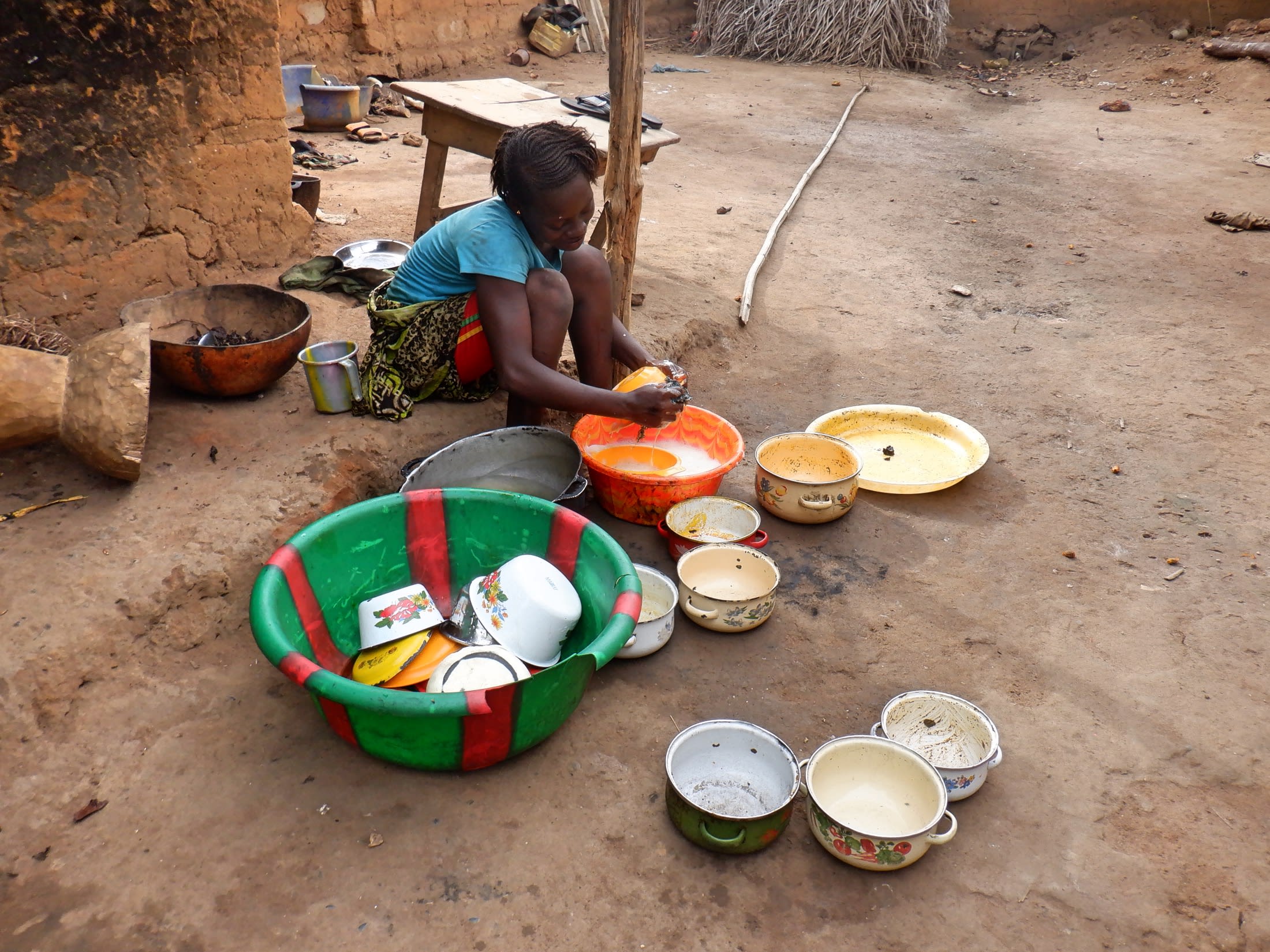Climate change and overuse have crippled Forikolo Community's hand-dug well. When the well inevitably runs out of water in the driest months of the year, this sends Forikolo's 93 people out to a nearby stream to fill their water containers. During the remainder of the year, they are left waiting in lines at the overcrowded well. Needless to say, neither water source serves the community's needs well.
As a result, everything in the community runs late or goes undone. Without adequate water, it's hard to accomplish simple tasks like laundry, washing dishes, or bathing.

"The shortage [of] water in this community is affecting my daily activities," said 45-year-old farmer Fatmata Conteh (pictured on the left).
"The well with the pump is the source where everyone rushes to fetch water in this community. It is difficult for my children and I to fetch enough water in this house, especially in the morning before they leave the house for school. Sometimes, it could be hard for me to get enough water in this house to do all my daily activities on time."
 16-year-old Alusine S. (pictured on the right) fetches water for his family twice a day, before and after school, and yet he dreads it the most out of any of his chores. "That is the most difficult moment that I am always worried about, even when I am in school. I think about the quarrels at the pump when there are lots of people waiting to fetch water, and the long distance to the stream to fetch water. It is not easy sometimes to fetch water [in] large quantities from the well in this community or the stream."
16-year-old Alusine S. (pictured on the right) fetches water for his family twice a day, before and after school, and yet he dreads it the most out of any of his chores. "That is the most difficult moment that I am always worried about, even when I am in school. I think about the quarrels at the pump when there are lots of people waiting to fetch water, and the long distance to the stream to fetch water. It is not easy sometimes to fetch water [in] large quantities from the well in this community or the stream."
No matter how long it takes, most people would rather wait in line at the pump than go to the stream. The stream is roughly a 30-minute walk from Forikolo through a wild and bushy area where snakes and scorpions have been known to lurk. This explains why the community's children fear fetching water there.
"It is harder to fetch water from the stream because the road is far and challenging," Fatmata explained. "It is not easy to do a single trip of water from the stream. This is one of the reasons that my house would be empty of water. My children become angry when I tell them to fetch water from the stream, because it is not an easy task. They would also be frightened to go to the stream alone, except they wait for other people who would be going to the stream to fetch water at the same time. This would cause a delay on the use of water at that moment. Life is becoming more difficult for me in this community when access to water is a challenge."
Although the community members have become used to drinking the stream's water when they have no other choice, it is likely taking a toll on their health. People do laundry and bathe at the stream so they won't have to haul containers of water back to their homes. Domestic and wild animals drink and defecate on the shores. And the fact that they delay tasks like washing dishes, bathing, and cleaning means that they are even more likely to fall ill from preventable diseases.

Reliable water will help Forikolo's people stay healthy, regain lost time, and accomplish everything they need to throughout the day.
Here’s what we’re going to do about it:
Well Rehabilitation
The well marked for this overhaul is dry for a few months every year and needs major work to supply adequate, clean water to the community year round. The pump will be removed, and a hand auger will be lowered inside and powered by a drill team. This hand auger will allow the team to drill several meters deeper to hit a sufficient water column that will ensure the well supplies water throughout all seasons.
As the team drills, casing will be installed, transforming the bottom of this hand-dug well into a borehole. PVC piping will connect this lower system directly to the pump, a construction that we know will also improve the quality of water.
Once this plan is implemented, everyone within the community will have access to safe drinking water in both quality and quantity, even through the dry months.
Hygiene and Sanitation Training
There will be hygiene and sanitation training sessions offered for three days in a row.
After our visit, the hygiene and sanitation trainer decided it would be best to teach community members how to build a tippy tap (a hand-washing station built with a jerrycan, string, and sticks). They will use these tippy taps for handwashing demonstrations, and will also teach about other tools like dish racks and the importance of properly penning in animals.
These trainings will also strengthen the water user committee that manages and maintains this well. They enforce proper behavior and report to us whenever they need our help solving a serious problem, like a pump breakdown.

 Drinking the water caused severe consequences. Many in the community suffered from waterborne diseases that created health problems, affecting their daily lives. Limited accessibility also meant people wasted time collecting sufficient water to meet their needs. The difficult journey to collect water sapped their physical and emotional energy, creating roadblocks. For Fatmata, it lessened her opportunity to collect enough water for her family's needs and to produce palm oil, the source of her daily income.
Drinking the water caused severe consequences. Many in the community suffered from waterborne diseases that created health problems, affecting their daily lives. Limited accessibility also meant people wasted time collecting sufficient water to meet their needs. The difficult journey to collect water sapped their physical and emotional energy, creating roadblocks. For Fatmata, it lessened her opportunity to collect enough water for her family's needs and to produce palm oil, the source of her daily income.


 Borehole Well and Hand Pump
Borehole Well and Hand Pump




























